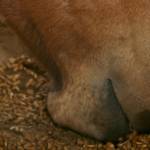Problems of the Salivary Glands in Horses

Inappetence among horses stems from numerous causes. One little-known cause is salivary gland inflammation, usually brought about by infection. Also called sialoadenitis, this problem is reported infrequently in horses, even though it may cause pain and difficulty swallowing in addition to inappetence.
Sialoadenitis usually affects the parotid gland, which is the largest and most productive of the salivary organs. Of the 18 horses presented to the University of California, Davis, with sialoadenitis, the parotid was implicated in 11 of the cases. Age of the horses ranged from 4 to 30 years old. Most of the horses diagnosed with sialoadenitis were found to have dental anomalies or other oral abnormalities, and researchers thought that dental diseases and sialolith formation may account for the sialoadenitis.
Sialoliths are salivary gland stones or calculi, similar to the more familiar enteroliths, and are usually composed of calcium phosphate, calcium, and traces of other minerals. Like enteroliths, sialoliths typically form around a minute foreign body that becomes the center of the mass, called a nidus, and enlarge as more and more minerals are layered over the nidus.
Cases of sialolithiasis or salivary calculi formation have been published in veterinary literature. The Canadian Veterinary Journal reported a case in which an 11-year-old mare was presented to the Atlantic Veterinary College, University of Prince Edward Island, with a moveable mass over her cheek. Radiography disclosed an opaque ovoid mass. A sialolith with an organic nidus was removed from the left parotid duct, and the mare recovered from the surgery uneventfully.








